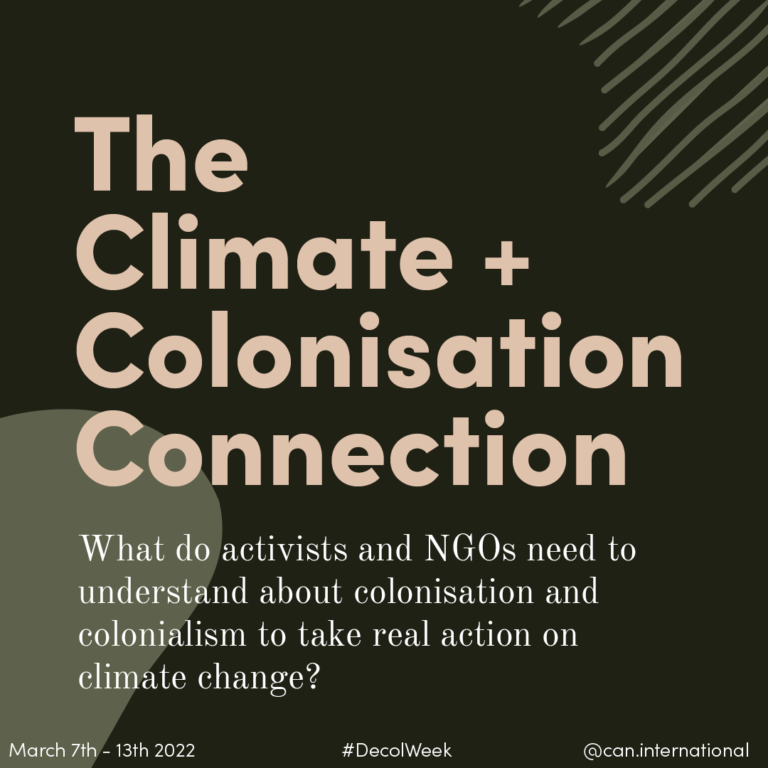CAN Decoloniality Digital Campaign

What do activists and NGOs need to understand about colonisation and colonialism to take real action on climate change?
As a global climate movement, we need to move on from thinking about Climate Change as an isolated issue that can be “solved” with surface level and technological solutions. We know that keeping global temperature rise below 1.5℃ requires transformational change in our societies and economies, but our approaches to climate change and campaigns for action often fail to meaningfully address the systems and structures at the root of climate change and the harms it causes for communities.
Blog
Climate change magnifies injustice
Climate Change is caused by human systems, and it magnifies injustices and inequities within them. Prominent Indigenous Public Health Physician, and climate activist, Dr Rhys Jones (Ngāti Kāhungunu) refers to climate change as a “threat multiplier” due to its disproportionate impacts on structurally oppressed communities, such as Black, Brown, Indigenous, and other People of Colour; disabled people; Global South, and diverse SOGIESC (Sexual Orientation, Gender Identity and Expression, and Sex Characteristics) communities, and the ways in which it tends to amplify these issues.
For example, climate change impacts are disproportionately felt by those Indigenous communities whose livelihoods are dependent on primary industries and their local environment. When climate impacts like flooding and droughts impair their crops, or change the distribution of species they are reliant on, this directly affects their livelihoods and creates a “snowball effect”, also exacerbating other issues they face due to overall inequity and systemic oppression.
You can stay tuned for more of our #DecolWeek content to hear from frontline Indigenous activists about the climate impacts in their communities.
Colonisation as a driver climate change
Colonisation is one such example of systemic oppression that climate campaigners and activists need to understand to be able to take meaningful climate action. We can consider Colonisation as a root cause of climate change because it…
Climate Change exacerbates the harms of Colonialism
While Colonisation can be recognised as a root cause of Climate Change, Climate Change can also exacerbate the many harms of Colonialism. Some examples of this include:
How Climate Movements and Climate Action can perpetuate Colonialism
As activists and campaigners, we are dedicated to preventing the worst impacts of climate change, and many of us consider ourselves to be conscious, community-minded people. However, movements, campaigns, and policies intended to take positive climate action can often do harm by perpetuating Colonial thinking and power dynamics.
Key examples of this include climate movements speaking over Indigenous Peoples, appropriating Indigenous Knowledge; and tokenising BIPOC activists and organisations, whether intentionally or unintentionally. These phenomenon often occur subtly, like repackaging perspectives from Indigenous activists or organisations without acknowledgment or agreement that this is appropriate; requiring your organisation’s brand to be on any Indigenous initiatives you fund or support; co-opting Indigenous members to your organisation’s Boards or Executive Committees without appropriate institutional support and more.
We will cover this more in depth in an upcoming discussion on tokenism, so make sure you follow the rest of our #DecolWeek content.
Climate movements, and charities in particular can also perpetuate Colonialism in their marketing and campaigns, commodifying the suffering of frontline communities, who are most often Black, Brown, or Indigenous, for the consumption of typically Western and White donors.
This will be covered more in depth in #DecolWeek content and Festival of Ideas Workshop on Ethical Storytelling and Story Sovereignty, but in the meantime we encourage you to listen to the insightful podcast discussion on this topic by the No White Saviors team.
Initiatives touted to prevent climate change or mitigate its impacts can also perpetuate Colonial harm. For example, many “Green Energy” initiatives have been reported to forcibly remove Indigenous Peoples from their territories, and violate their rights. Climate actions and policies can also cause harm by consolidating power in institutions and governments that do not uphold the Rights of Indigenous Peoples, for example, policies set up with the intent to impose sustainability requirements on businesses, organisations, and corporations may also affect Indigenous Peoples who have been forced through colonial policies to incorporate and organise themselves into such institutional models; and other initiatives can overextend the reach of local, national, and regional governments to control lands and “natural resources” in the name of sustainability, violating Indigenous Rights to self-determination on these issues.
What can I do?
Learning about Colonisation, Colonialism, and its impacts for the first time can be challenging. As activists, we often want to leap to action when we learn about harms occurring, especially when they may be coming from our own movements or our own behaviour. However, when we jump to action without fully understanding the complex nuances of this issue, there is a real risk of doing more harm than good.
The first step to taking informed and appropriate action is listening.
We encourage you to sit with this information and commit to learning more deeply about this issue from Indigenous perspectives. We have put together a suite of resources for this #DecolWeek, and prepared workshops at the Festival of Ideas for this reason. Take some time to learn from the resources shared over the next week, and join us in carefully considering our future actions in the Institutional Transformation sessions at the CAN International Annual Strategy Meetings next week.
In the meantime, you can help by spreading the word. If you find this resource useful, you can share it or it’s accompanying social media posts with your networks.

